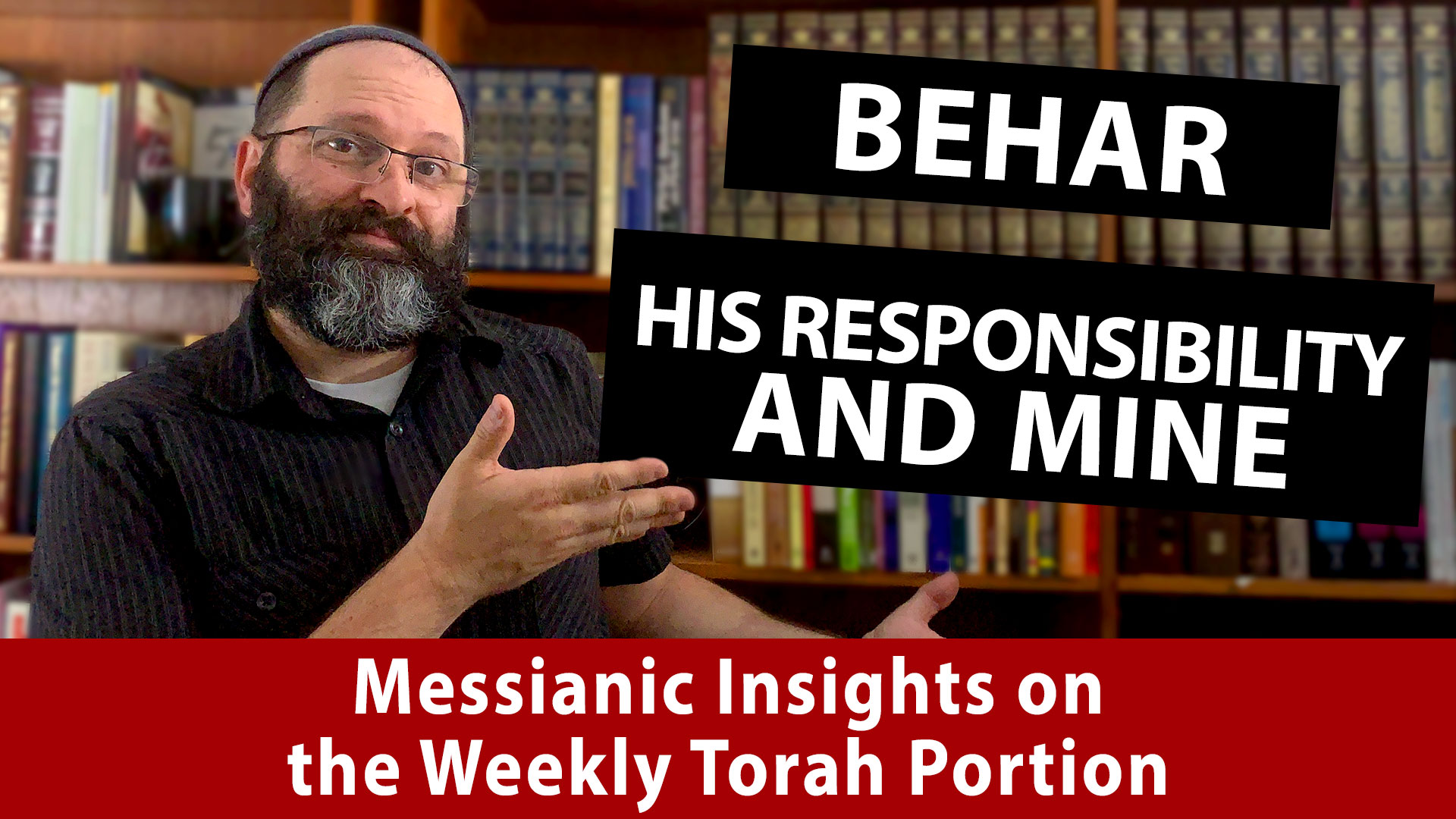His Responsibility & Mine
Series:

Leviticus 25:1-26:2
His Responsibility And Mine
As we have said in the previous editions of 5 Minute Torah, our current Torah portion is focused almost exclusively on the laws of the Shemitah (the sabbatical year) and the Yovel (the Jubilee, or 50th year). It describes how farmers living in Israel should allow their land to rest on the seventh year and depend on Hashem for their livelihood while they are not sowing or harvesting, or pruning their vineyards. It tells how the fiftieth year should be a year to release both land and indentured servants. It then speaks of how one should treat a poor person who sells himself into a position of servitude, followed by how the community should work to redeem a brother who has become impoverished and sold himself to a foreigner. It concludes with a prohibition against idolatry and a reminder to honor the Sabbath, as well as the Tabernacle.
Living in a time nearly two thousand years removed from the Holy Temple when the land of Israel is not governed by a righteous king, nor a religious court, do these laws have any significance for us today? Although not all of them, some of them continue to have the same application as they did in the days of the Holy Temple. For example, the religious Jewish community in Israel observes the Shemitah and has strict rules about produce grown on Jewish-owned land within the boundaries of Israel during the seventh year. These laws do not apply to non-Jews living within Israel, nor to land outside of Israel, and they are not enforced by a civil court. Another aspect is related to debts. Religious Jews continue to absolve all personal debts from other Jews in the Shemitah whether in Israel or the Diaspora, the land outside of Israel.
Outside of these two aspects of the Shemitah, it doesn’t seem like much else from our Torah portion is directly applicable today, especially for those of us who are not Jewish and who live outside the land of Israel. However, if we examine the overarching theme of our portion we might see a common thread woven throughout this section of the Torah that can give us insight into a mindset for how we should be living. Considering the various laws enacted here we can conclude that God established each of them with one basic principle in mind: we are to take care of the needs of our brother, while trusting God to take care of our own needs. We are to be generous while relying on the generosity of our Heavenly Father.
We can learn an important lesson from our Master on this subject. In Matthew 6, Yeshua is continuing his epic sermon we call “The Sermon On The Mount.” The chapter opens with him teaching about giving to the needy. He tells his disciples, “Beware of practicing your righteousness before other people in order to be seen by them, for then you will have no reward from your Father who is in heaven” (verse 1). In this context, Yeshua is not using the word “righteousness” in the original sense, meaning to be in right standing in a covenant relationship. In this context, he is using it the way it had come to be understood during his day. He uses it to mean alms-giving or charity, as we can see when he continues by saying, “when you give to the needy …” (verse 2).
The next section (verses 5–18) deals with prayer and fasting. For the remainder of the chapter, however, he teaches on money (verses 19–24) and then the anxiety associated with physical needs (verses 25–34). In these last sections, we can see how Yeshua’s teaching runs parallel to the theme of our Torah portion. He tells his disciples to be generous to have a “good/healthy eye,” (verse 22) and take care of those in need. They are not to trust in money and riches, but to trust in their Heavenly Father for their needs. To emphasize this point, the chapter concludes this section of Yeshua’s teaching with this:
But seek first the kingdom of God and his righteousness, and all these things will be added to you. Therefore do not be anxious about tomorrow, for tomorrow will be anxious for itself. Sufficient for the day is its own trouble. (Matthew 6:33–34).
In other words, as we are seeking the Kingdom we should always trust in Hashem’s righteousness—His charity—to take care of our needs. Rather than trying to figure out some way to stack the cards to our advantage, we should simply do what is ours to do and let Him take care of the rest. The Creator of the Universe can handle our situation far better than we can. We don’t have to worry about anything. After all, we are His children—and He takes care of His kids.








